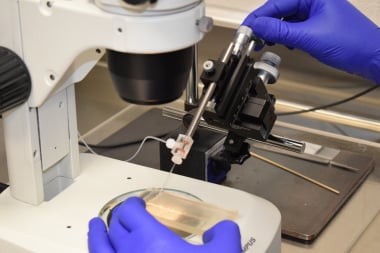
The Greenwood Genetic Center is committed to advancing the understanding and treatment of genetic disorders through our Division of Research. Our work benefits the patients and families we serve and provides knowledge and breakthroughs that provide hope for those impacted by genetic disorders across the globe.
Current Research Areas at GGC – GGC’s Division of Research is pursuing a broad range of active research projects related to rare genetic disorders. With both basic science research initiatives and patient-specific functional studies, our research team collaborates with colleagues across GGC as well as with scientists around the world to advance our understanding of genetic disorders. GGC’s current active areas of focus include lysosomal storage disorders, congenital disorders of glycosylation, and other rare diseases using both cell-based and animal models.
Neural Tube Defects Prevention Program – Since 1992, GGC and partners at the SC Department of Disabilities and Special Needs and the SC Department of Environmental Control have worked to prevent severe birth defects of the brain and spine (neural tube defects) through research and education on the use of folic acid by women of childbearing age.
Clinical Studies – GGC clinicians and researchers collaborate with external research partners and industry to enroll patients into clinical trials for a number of genetic disorders and promote the diagnosis and treatment of genetic disorders.
Intellectual Disability – GGC has a long and productive history of advances in the area of intellectual disability (ID), particularly X-linked ID (XLID). While this is no longer an active area of study for the Division of Research, GGC has compiled and archived XLID resources including a list of XLID syndromes and gene localizations to support clinicians in their diagnosis and treatment of patients with XLID.
